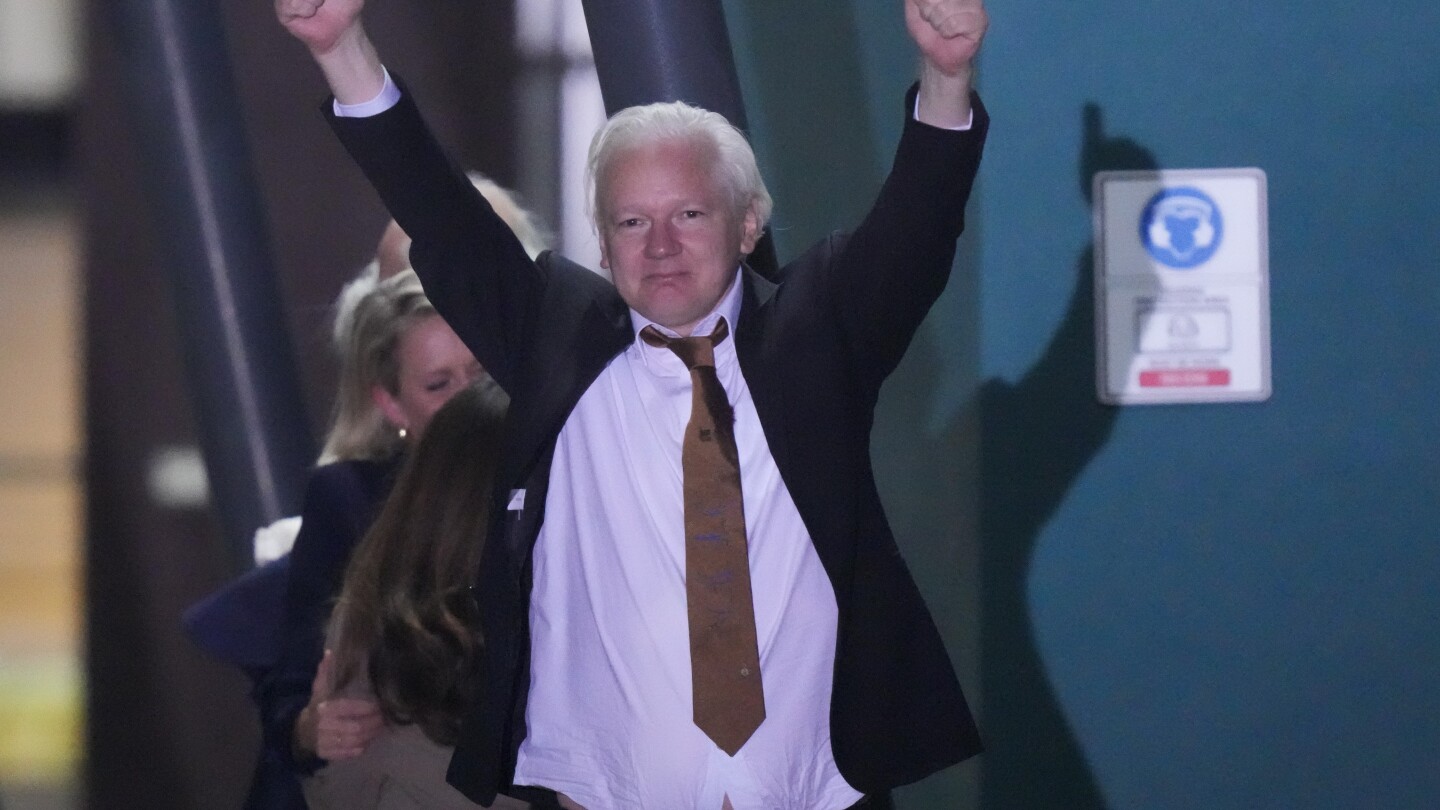WikiLeaks founder Julian Assange returned to his homeland Australia aboard a charter jet on Wednesday, hours after pleading guilty to obtaining and publishing U.S. military secrets in a deal with Justice Department prosecutors that concludes a drawn-out legal saga.
The criminal case of international intrigue, which had played out for years, came to a surprise end in a most unusual setting with Assange, 52, entering his plea in a U.S. district court in Saipan, the capital of the Northern Mariana Islands. The American commonwealth in the Pacific is relatively close to Assange’s native Australia and accommodated his desire to avoid entering the continental United States.
Assange was accused of receiving and publishing hundreds of thousands of war logs and diplomatic cables that included details of U.S. military wrongdoing in Iraq and Afghanistan. His activities drew an outpouring of support from press freedom advocates, who heralded his role in bringing to light military conduct that might otherwise have been concealed from view and warned of a chilling effect on journalists. Among the files published by WikiLeaks was a video of a 2007 Apache helicopter attack by American forces in Baghdad that killed 11 people, including two Reuters journalists.
Assange raised his right fist as he emerged for the plane and his supporters at the Canberra airport cheered from a distance. Dressed in the same suit and tie he wore during his earlier court appearance, he embraced his wife Stella Assange and father John Shipton who were waiting on the tarmac.



Yes. I applaud them both for whistleblowing. They really fucked up by not redacting names. It’s reckless and dangerous. Assange should’ve known better, having been a professional journalist.
https://www.businessinsider.com/snowdens-cache-of-secrets-likely-means-life-or-death-for-several-people-2013-11
Oh weird, that was not the impression I got from the many comments you made criticizing them for their brave actions.
I would tend to blame any negative fallout on the US government, personally. If they weren’t committing atrocities regular people wouldn’t have had to take the huge risk/be put at risk.
It’s like getting upset at a victim of police brutality for not working with the police
Their actions were brave until they became clouded by fame. Then both of them made it about leverage and made crucial mistakes that lead to threatened lives. I supported them in the past, prior to their dangerous missteps. I no longer comment in support of either of them.
A good example of responsible whistleblowing would be from the recent resignations from the Department of Defense. They gave very detailed accounts of information suppression while they were tasked with collecting information on civilian casualties in Gaza. None of the information they disclosed exposed confidential informants or put lives at risk.
It’s not just possible to be a responsible whistleblower, it’s imperative.
You’re saying they should’ve just resigned? How would we have learned about PRISM without evidence?
I don’t know what you’re referring to about info suppression. Did we learn anything or just that we don’t know everything? How is that more helpful? Or, for who is it more helpful?
No, I’m saying they shouldn’t have left the names unredacted in their leaks. That put people in danger.
Assange was a journalist. He wasn’t a government official.
Do you think they could’ve done that and chose not to?
It seems like you’re saying they shouldn’t have done what they did because it wasn’t executed perfectly which feels awfully like what MLK was criticizing in his letter from a Birmingham jail, people that support things in theory but never in reality and that always seem to solely criticize the actions/methods of those fighting for justice
Absolutely. Assange especially. He is fully aware of the redaction standards in journalism.
They both started out as legitimate whistleblowers, disclosing government corruption responsibly. Once they became famous/infamous, they both went down the slippery slope of power corruption and risked people’s lives for clicks. I have no respect for it.
Could you expand on what Snowden did that you disagree with?
I can’t. I was referring to articles that I’ve read in the past. By asking me that, I was prompted to look for a source, and it doesn’t seem like Snowden has directly compromised the safety of anyone. Most of the articles that I’m finding have general government insinuation of risk. That’s not enough for me to form an opinion, so I apologize, and retract my criticism of Snowden.
I still maintain that what Assange did was reckless, especially given his experience as a journalist.